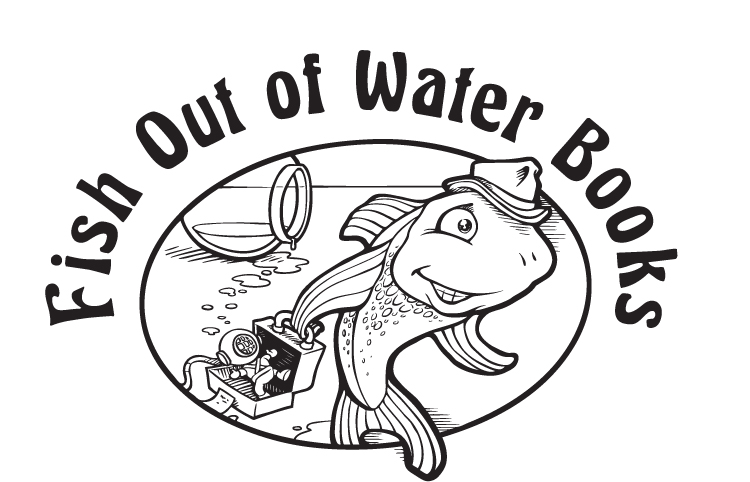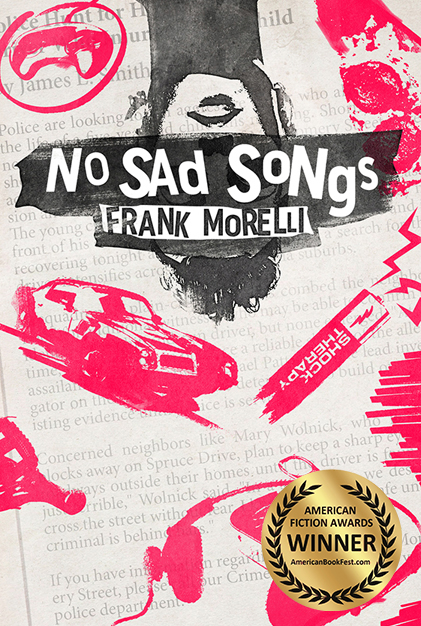BACKGROUND INFORMATION / AUTHOR Q&A
When did you first decide to write "No Sad Songs" and how long did the process take?
The concept for No Sad Songs had been brewing up inside of me since my high school years. Back then, I was living a pretty charmed life. I went to school, played sports, and lived on a nice, suburban street. My life was about as “normal” as any teenage life could ever be. Then we started noticing changes in my grandfather. Little things. Like, he’d forget to send birthday cards which he’d been known to send early, or he’d lose his keys or forget an appointment. Then it seemed like we went to sleep one night and woke up the next morning and my grandfather was this completely different person; one who needed assistance just to get through the daily tasks of living. That assistance came in the form of my father, a man who worked full time and dedicated every other waking second to keeping my grandfather out of a nursing home. He did a good job of masking the toll it was taking on him, but he could never hide it from me. And although I never said it to him, I couldn’t get past the thought: what if it had been me? What would I have done if my father hadn’t been around to absorb the family responsibility before it ever spread in my direction? How would I have responded? Would I have survived? Gabe LoScuda was born directly out of these questions. His story was a way for me to explore the same puzzling thoughts many of us have when our loved ones begin to become unrecognizable to us.
It took me a good fifteen years before I realized Gabe LoScuda was the man for the job. That happened in the summer of 2015. Once I gave Gabe license to relate my personal experiences through his background, the story charged forward at warp speed. A year later the book was complete.
What do you want readers to take away from reading "No Sad Songs"?
My grandfather battled Alzheimer’s for eight long years. That’s not an insignificant amount of time in anyone’s life. What it meant for me was that I watched my grandfather deteriorate for about twenty-five percent of my life. There’s a real sense of helplessness and loss that pushes down on you when you watch a slow deterioration like that. At the same time, there’s an overpowering weight of responsibility that drives most caregivers to keep pushing on no matter the price.
The Alzheimer’s Association estimates almost a quarter of a million people will be diagnosed with Alzheimer’s or another form of dementia in the next year alone. Currently, more than five million people are living with Alzheimer’s and, by 2050, this number could grow to over sixteen million. Alzheimer’s disease is actually the sixth-leading cause of death in the United States. But it’s the only cause of death among the top ten in the United States that cannot be prevented, cured or even slowed. In fact, one out of every three seniors dies with some form Alzheimer’s or dementia.
What many fail to recognize is how their family members (the caretakers) may also have their lives derailed by the disease. Right now, more than fifteen million Americans provide unpaid care for people with Alzheimer’s or other dementias.
It is my hope that young readers will finish No Sad Songs with a new respect for what it takes to be a caregiver, and an understanding of how intertwined these duties become in the lives of people fighting on the front lines of a growing health dilemma that is rapidly approaching epidemic levels. And I want them to be inspired to become champions in the fight against this terrible disease so that future generations will never have to watch their loved ones disappear right before their eyes.
Source: Alzheimer’s Association. “2017 Alzheimer’s disease facts and figures.” Alzheimer’s & Dementia 13.4 (2017): 325-373.
Did you base any of the characters on people you know? Do you have any favorite character(s)?
I wouldn’t say any of the characters in No Sad Songs have exact doppelgangers out there in the real world, but I think all authors base their fictional people off of what they know about real people. In that respect, Gramps is definitely a mash-up of my own grandfather and other grandfathers I’ve come to know through friends and loved ones. Many of Grandpa’s outbursts in the book are, in fact, directly inspired by actual outbursts I witnessed from my grandfather when he was in the final stages of the disease. Oh, and I guess I’ll say this: Gabe’s epic failure in trying to get Marlie to notice he exists may or may not be a good indication of how many dates I had in high school. I’m not saying a word.
Now, I know I’m going to hear it from my characters for picking a favorite, but I’ll do it anyway. It’s Sofia. Hands down. She never shies away from the truth. She doesn’t give anyone a pass. She isn’t afraid to live life on her terms. We all need people like that in our lives–people who aren’t afraid to reflect the truth back on us when we’re blinded by our own brilliance. It’s not easy to be that person, but I think Sofia has the ability to make it look effortless. For that I respect her.
Do you have any favorite chapters or parts of the book?
One of my favorite parts to write was Gabe’s personal essay project that runs throughout the book. It was a joy to sit down with accordion-thick poetry anthologies and books of sheet music searching for interconnected themes Gabe might use to express the emotions of his past. In one particular essay that I always go back to, Gabe recounts the first time he ever played catch with his father and grandfather. He talks about stuffing his whole face inside the glove and inhaling the rich scent of the rawhide, and every time I reread that essay it connects back to one of the quintessential moments in what it means to be an American.
Was the time period for "No Sad Songs" (the 1990s) an important consideration?
Yes, very much so. I toiled with this question more than any other during the planning phases for No Sad Songs. Ultimately, I decided I wanted to channel my own observations through Gabe LoScuda’s story and I wanted those observations to be as authentic as possible. Since my experiences took place in the 90s and since I’d been mulling this story over in my mind since that time, I felt I was most equipped to set the story in that time.
How important of a role does music and literature play in the book?
In a word: major. I think music drives our lives more than any other artistic medium because it provides us with the soundtrack to our days. Even when it’s just playing in the background and you’re not really paying attention to it, music still moves us in ways we can’t fully describe. In fact, I challenge you to find a teenager on the planet who doesn’t have a personal anthem or at least a favorite song to lean back on for reassurance when they’ve had one of those days. The same can be said of poetry, though I doubt Emily Dickinson has as many screaming fans as Ed Sheeran these days. What I wanted to do in No Sad Songs was explore the lyrical qualities of each and show how the universal truths within songs and poems play out in real time every day in our lives. We just have to pay better attention. Therefore, Sofia’s love of classic punk rock and the raw emotion that comes out of it mixes with Gabe’s poetic studies and, in a way, acts as a roadmap to save them from themselves. That, and it gave me the sparkling opportunity to highlight some excellent music from the 80s and 90s that is not only still relevant today, but also sorely missed.
Are you working on any other books or short stories?
I just put the finishing touches on a young adult novel about a high school hockey star from Minnesota whose family situation forces him to start over in the piedmont of North Carolina, where hockey dreams dry up with the tobacco leaves. The lead character is a classic movie buff and an aspiring screenwriter and he relates parts of the story to the reader as if it were a movie, in actual screenplay format. It was a fun challenge to mold together the character’s first person narration with bursts of authentic screenwriting, but I think there’s a real visual feel to the book overall. I’m also working on a middle grades novel that is told completely in primary source material with two dueling narrators as they wage a media war against each other in the school newspaper. Recently I participated in the NYC Midnight Short Story Competition and was named a finalist after writing three new short stories that should be out in various publications toward the end of 2017. I’ve also been getting back to my roots as a sportswriter, providing a monthly column for Change Seven Magazine entitled “Peanuts & Crackerjacks.” I’ve been pretty busy . . . which is like the dream mantra for any writer to be able to repeat.
Tell us a couple of weird and wacky facts about yourself.
I always lead with this: I have no spleen. Yes, I said spleen. I lost it in a tragic baseball accident in which I was unable to complete the double play. That was the tragic part. Losing the bodily organ was really more of an inconvenience, but it made me realize in an instant that I am not invincible and that everyone does, in fact, have a shelf life—so it’s vitally important to accomplish your goals while you have the chance.
Also, I think I have more tattoos than Sofia—most of which came while I was actively writing No Sad Songs. I figure when I’m eighty years old and start to regret having tattoos I can always just tell people I did it in the name of research.

